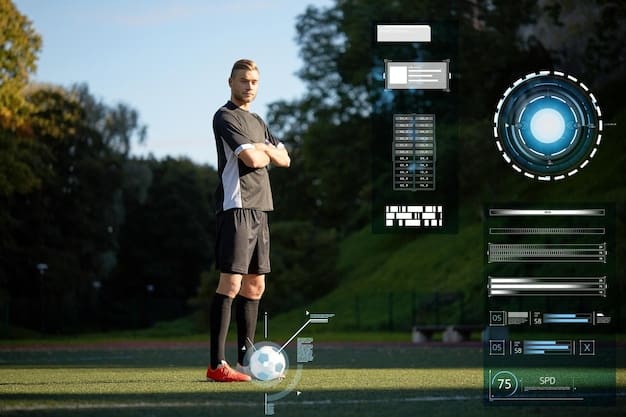AI in Soccer: Ethics, Innovation & Fair Play in US

The integration of artificial intelligence into soccer in the US raises critical ethical considerations, demanding a careful balance between technological innovation and the fundamental principles of fair play to ensure the sport’s integrity and equitable competition.
The rapid integration of artificial intelligence (AI) into various facets of our lives has inevitably reached the pitch, transforming how soccer is played, managed, and consumed. In the US, the discussion around The Ethical Considerations of Using AI in Soccer: Balancing Innovation and Fair Play in US is gaining significant traction, inviting a critical look at how this powerful technology can enhance the sport without compromising its integrity or inherent human element.
the evolving role of ai in us soccer
Artificial intelligence is no longer a futuristic concept; it’s actively reshaping the landscape of US soccer. From player development and tactical analysis to fan engagement and refereeing, AI’s applications are diverse and growing. This pervasive presence necessitates a thorough examination of its implications beyond mere technological advancement.
The embrace of AI in soccer is driven by the promise of unprecedented efficiency, data-driven insights, and enhanced experiences. Coaches use AI to dissect player performance, identify subtle trends, and even predict injury risks. Scouts leverage AI to sift through vast pools of talent, unearthing hidden gems that might otherwise be overlooked. On the analytical front, AI algorithms can process game footage at speeds impossible for humans, providing real-time strategic recommendations that could swing the outcome of a match.
data-driven insights and player development
AI’s capacity to process colossal datasets makes it invaluable for understanding complex patterns in player performance. This goes beyond simple statistics, delving into biomechanics, fatigue patterns, and even psychological states. Such insights are proving crucial for tailoring training regimes and optimizing recovery, ultimately aiming to create more robust and skilled athletes.
- Performance Optimization: AI analyzes vast amounts of biometric and tactical data to fine-tune individual player performance.
- Injury Prevention: Predictive analytics based on historical data and real-time biometric inputs can flag potential injury risks, allowing for preemptive interventions.
- Talent Identification: AI helps scout new talent by identifying patterns in player data sets that correlate with future success, even in remote or under-scouted regions.
However, the reliance on data, though powerful, introduces questions about the human element. Will the artistry and spontaneity of soccer be diluted by an overly analytical approach? How do we ensure that players are not reduced to mere data points, but rather seen as individuals with unique strengths and challenges?
refereeing and fair play concerns
Perhaps one of the most contentious applications of AI in soccer is in refereeing. Technologies like VAR (Video Assistant Referee) already utilize AI components for offside detection and goal-line technology. The goal is clear: eliminate human error and enhance fairness. Yet, the implementation has been met with mixed reactions, highlighting the delicate balance between precision and the flow of the game.
The ethical challenge here is profound. If AI systems become the ultimate arbiters, what happens to the human judgment component? How transparent are these systems, and can biases be inadvertently coded into their algorithms? Ensuring that AI enhances fair play without stripping away the spirit of human decision-making, acknowledging that even human officials make mistakes, is a critical tightrope walk.
The expansion of AI into subjective calls, like fouls or handballs, further complicates matters. While VAR aims for objectivity, the interpretation of rules often involves nuanced judgment that AI might struggle to replicate or explain. The current debate around consistency and speed of VAR decisions underscores the ongoing tension between technological infallibility and human acceptance.
Ultimately, the role of AI must be carefully defined to ensure it serves to uphold fair play, not undermine the human drama and decision-making that is intrinsic to the sport. The ethical framework must demand transparency, accountability, and the preservation of the game’s human essence.
data privacy and security: a growing concern
As AI systems collect and process vast amounts of sensitive data—from biometric information of players to detailed fan demographics—data privacy and security emerge as paramount ethical considerations. In the US, where data protection regulations are continually evolving, soccer organizations must navigate a complex landscape of legal and moral obligations.
The collection of player data, including physiological responses, movement patterns, and even real-time emotional states, raises questions about consent, ownership, and the potential for misuse. Who owns this data? How long is it stored? And how can players ensure their personal information isn’t exploited for purposes beyond their athletic development?
player data: ownership and consent
The sophisticated nature of AI systems means they can compile highly granular profiles of athletes. This includes not only their on-field performance but also data revealing their physical vulnerabilities, mental resilience, and even off-field habits inferred from smart devices. The ethical imperative demands clear policies on data ownership and informed consent.
- Explicit Consent: Players must provide clear and informed consent for the collection and use of their data, understanding the scope and purpose.
- Data Ownership: Clarifying who owns the data—the player, the club, or a third-party AI provider—is crucial for managing its lifecycle.
- Right to Be Forgotten: Players should have the right to request deletion of their data, especially after retirement or transfer, subject to legal obligations.
Without robust frameworks, there’s a risk that players could be inadvertently pressured into waiving their data rights, or that their information could be shared with unauthorized third parties. The potential for discrimination based on data-driven profiles, affecting contract negotiations or team selection, adds another layer of complexity.
safeguarding fan data and engagement
AI’s reach extends beyond the field to fan engagement, with personalized content, ticketing systems, and immersive viewing experiences. This involves collecting fan data—from browsing habits and purchasing history to location information. While enhancing user experience, this also creates a significant responsibility for data custodians.
Breaches of fan data can lead to identity theft, financial fraud, and a significant erosion of trust. Implementing robust cybersecurity measures and adhering to evolving privacy laws, such as the California Consumer Privacy Act (CCPA) or similar state-level regulations, is non-negotiable. Transparency about data collection practices and clear opt-out options are essential for maintaining ethical fan engagement.
Furthermore, AI-driven personalization must avoid creating echo chambers or manipulative content that could unduly influence fan behavior or opinions. The ethical use of AI implies respecting user autonomy and providing value without resorting to intrusive or exploitative practices. The balance lies in leveraging data for meaningful engagement while upholding individual privacy rights.

bias and fairness in ai algorithms
A critical ethical consideration in AI development is the potential for bias within algorithms. AI systems learn from data, and if that data reflects existing societal biases, the AI will perpetuate and even amplify them. In soccer, this could manifest in various insidious ways, impacting player evaluation, refereeing decisions, and even strategic advice.
Bias isn’t always intentional; it can be a byproduct of incomplete or skewed datasets. For example, if an AI is trained predominantly on data from male athletes, its conclusions might be less accurate or fair when applied to female athletes due to inherent physiological differences not adequately represented in the training data. The absence of diversity in data inputs can lead to inherently biased outputs.
unintended bias in player evaluation
When AI is used for scouting or player performance assessment, the algorithms must be rigorously tested for bias. If historical data primarily features players from certain demographic backgrounds, playing styles, or physical attributes, the AI might inadvertently discriminate against those who deviate from the ‘norm’. This could lead to promising talents from underrepresented groups being unfairly overlooked.
- Demographic Bias: Algorithms reflecting biases in historical scouting data, potentially overlooking talent from specific regions or socioeconomic backgrounds.
- Style Bias: AI optimized for certain playing styles might undervalue unconventional or emerging tactical approaches.
- Gender and Racial Bias: Inadequate or skewed training data can lead to AI systems making prejudiced assessments based on gender or race, rather than objective skill.
Ensuring diverse and representative datasets is not just a technical challenge but an ethical imperative. Developing AI that is sensitive to cultural nuances, diverse playing styles, and physiological differences across various athlete populations is crucial for maintaining fairness in talent identification and development.
algorithmic transparency and accountability
The “black box” nature of many advanced AI algorithms poses a significant challenge to accountability. If an AI system makes a controversial decision—say, a refereeing call or a player transfer recommendation—it can be difficult to discern precisely why that decision was made. This lack of transparency undermines trust and makes it challenging to identify and rectify biases.
Ethical AI design demands explainability, so stakeholders can understand the reasoning behind AI-driven recommendations. This doesn’t necessarily mean deciphering every line of code, but rather providing interpretable insights into the key factors influencing an AI’s output. Establishing clear lines of accountability for AI-generated decisions is equally important.
Furthermore, regular auditing of AI systems by independent bodies can help uncover latent biases and ensure compliance with fairness principles. Without transparency and mechanisms for oversight, AI in soccer risks becoming an opaque, unaccountable force, potentially eroding the fundamental principles of fair competition and human agency.
human interaction and the future of coaching
The increasing reliance on AI in soccer raises profound questions about the nature of human interaction within the sport, particularly regarding the role of coaches, players, and even fans. While AI offers powerful tools, it must not diminish the invaluable human element that defines the game.
The artistry of coaching, which involves intuition, empathy, and personal relationships, risks being overshadowed by algorithm-driven insights. Similarly, players might feel less autonomous if their every move is being dissected and dictated by an AI system. The key is to leverage AI as a sophisticated assistant, not a replacement for human judgment and connection.
preserving the coach’s intuition and leadership
Great coaches possess an almost unquantifiable ability to inspire, motivate, and adapt to unforeseen circumstances. While AI can provide analytical depth, it cannot replicate the nuanced interpersonal skills vital for team cohesion and individual player development. The fear is that coaches might become over-reliant on AI, losing touch with their own intuition and leadership qualities.
The ethical challenge here is to ensure that AI serves to augment, rather not to supplant, the coach’s primary role. AI should empower coaches with data and insights, allowing them to make more informed decisions, but the final call, particularly regarding human dynamics, must remain with the coach. Training programs for coaches must evolve to include AI literacy, teaching them how to effectively integrate these tools without losing their human touch.
Moreover, the ethical use of AI means acknowledging its limitations. AI can predict patterns, but it cannot understand complex human emotions, resolve interpersonal conflicts, or react spontaneously to the unpredictable flow of a game in the same way a human leader can. The synthesis of AI data with human wisdom is the optimal path forward.
player autonomy and well-being
For players, the pervasive use of AI in performance tracking raises concerns about autonomy and mental well-being. Constant monitoring, while intended to optimize performance, can create an environment of surveillance that impacts a player’s sense of freedom and enjoyment of the game.
- Over-analysis Stress: Players might feel excessive pressure if every move is scrutinized by AI, potentially leading to mental burnout.
- Reduced Autonomy: Over-reliance on AI-driven instructions could diminish a player’s creative freedom and spontaneous decision-making on the field.
- Data-driven Expectations: Players might be unfairly judged or compared based solely on AI metrics, ignoring qualitative aspects of their contribution.
Ethical guidelines should ensure that AI is used to support player development and well-being, rather than becoming a tool for excessive control. Maintaining open communication between players, coaches, and AI specialists is crucial. Empowering players to understand their data and how it’s used can foster a sense of ownership and mitigate feelings of being merely a data point.
Ultimately, the human element—the passion, the teamwork, the unpredictable moments of brilliance—is what makes soccer so compelling. AI should enhance these aspects, not detract from them. Striking this balance is fundamental to ensure that technology serves the game, rather than dictating it.

ethical governance and regulation in us soccer
Given the transformative power of AI, establishing robust ethical governance and regulatory frameworks is paramount for its responsible adoption in US soccer. Without clear guidelines, the sport risks facing a patchwork of inconsistent practices, leading to potential disputes, competitive imbalances, and erosion of public trust.
The challenge lies in creating regulations that are agile enough to keep pace with rapid technological advancements while being firm enough to uphold core ethical principles. This involves collaboration between governing bodies, clubs, players’ associations, AI developers, and legal experts.
developing industry standards and best practices
To avoid a free-for-all, the US soccer landscape needs to develop comprehensive industry standards for AI implementation. These standards should cover aspects like data collection, algorithmic transparency, bias mitigation, and the responsible use of AI in decision-making processes. Early adoption of these standards can foster a culture of ethical innovation.
- Data Governance Protocols: Standardized rules for the collection, storage, and sharing of all types of data relevant to AI in soccer.
- Algorithmic Auditing: Regular, independent audits of AI systems to detect and correct biases, ensuring fairness and accuracy.
- Ethical Impact Assessments: Mandating pre-implementation assessments for new AI technologies to identify and mitigate potential ethical risks.
These standards should not be static; they must evolve as AI technology matures and new ethical challenges emerge. Continuous dialogue and knowledge sharing among stakeholders will be crucial for maintaining relevance and effectiveness. Establishing a dedicated body or committee focused on AI ethics within US soccer could provide oversight and guidance.
the role of governing bodies and players’ associations
Governing bodies like U.S. Soccer and Major League Soccer (MLS), alongside players’ associations, have a critical role to play in championing ethical AI use. They are uniquely positioned to advocate for player rights, ensure fair competition, and safeguard the integrity of the sport.
This involves not only setting regulations but also educating stakeholders—from club owners and coaches to players and fans—about the capabilities and limitations of AI. Players’ associations, in particular, can empower athletes by providing resources and legal advice regarding data privacy and the ethical implications of AI on their careers.
Furthermore, these bodies can facilitate pilot programs and research initiatives to rigorously test AI technologies in controlled environments before widespread adoption. This proactive approach allows for the identification of unforeseen ethical issues and iterative refinement of guidelines, ensuring that innovation proceeds responsibly and inclusively.
ensuring educational and equitable access to ai tools
As AI becomes more integral to soccer, a critical ethical imperative is to ensure equitable access to these powerful tools. A divide between clubs who can afford cutting-edge AI and those who cannot would exacerbate existing competitive imbalances, undermining the spirit of fair play and limiting opportunities for athletes from less affluent backgrounds.
The benefits of AI in player development, performance analysis, and injury prevention should not be exclusive to elite clubs. Democratizing access to these technologies is essential for fostering widespread talent development and maintaining a level playing field across all tiers of US soccer.
bridging the digital divide in soccer
The cost associated with advanced AI platforms and specialist personnel can be prohibitive for smaller clubs or youth academies. This creates a “digital divide” where resource-rich organizations gain a disproportionate advantage in talent identification, tactical analysis, and player optimization. Ethically, this imbalance must be addressed.
- Subsidized Access: Exploring models where governing bodies or tech companies subsidize AI tools for lower-tier clubs or youth programs.
- Open-Source Initiatives: Fostering the development and sharing of open-source AI tools that are accessible and customizable for a wider range of users.
- Centralized Data Repositories: Creating centralized, anonymized data repositories that clubs can access for training AI models, leveling the playing field for data-poor organizations.
Such initiatives could help ensure that promising young players, regardless of their club’s financial standing, have access to the same technological advantages in their development. This approach aligns with the core value of providing equitable opportunities for all who aspire to reach their full potential in soccer.
ai literacy and training for all stakeholders
Beyond access to the tools themselves, there’s an ethical responsibility to ensure that all stakeholders—coaches, players, referees, and administrators—possess sufficient AI literacy to understand, interpret, and critically evaluate AI-generated insights. Without proper training, even the most sophisticated AI tools can be misused or misinterpreted.
Educational programs tailored to different user groups are essential. Coaches need to know how to integrate AI data with their own expertise, players need to understand how their data is used, and referees need to comprehend the capabilities and limitations of AI-assisted decision-making systems. This fosters trust and ensures that AI is used responsibly and effectively.
Investments in AI education are investments in the future of the sport. By empowering everyone involved with the knowledge to engage thoughtfully with AI, US soccer can harness the full potential of these technologies while mitigating ethical risks and ensuring that innovation fosters, rather than hinders, fair play.
| Key Aspect | Brief Description |
|---|---|
| ⚖️ Fair Play | Ensuring AI enhances game fairness without replacing human judgment in crucial moments. |
| 🔒 Data Privacy | Protecting player and fan data from misuse and security breaches while leveraging insights. |
| 🤝 Human Element | Maintaining the role of intuition and human interaction; AI as augment, not replacement. |
| 📚 Equitable Access | Ensuring all clubs and players can access AI benefits, bridging the digital divide. |
frequently asked questions
▼
AI aims to enhance refereeing fairness by providing objective data for crucial decisions, like offside or goal-line calls. However, challenges arise with subjective interpretations and maintaining the flow of the game, underscoring the need for a balance between AI precision and human judgment for ethical implementation.
▼
Key concerns include the collection and storage of sensitive player biometrics and fan data. Ensuring clear consent, defining data ownership, and implementing robust cybersecurity measures are essential. The ethical challenge is to leverage data for insights without compromising individual privacy or creating avenues for misuse.
▼
Yes, AI can inadvertently introduce biases if trained on unrepresentative or skewed datasets, potentially leading to discriminatory player assessments. Ethical AI development requires diverse training data, regular algorithmic audits, and transparency to mitigate such biases and ensure fair opportunity for all athletes.
▼
AI should function as an augmentation tool for coaches, providing data-driven insights to inform decisions, not dictate them. The coach’s intuition, leadership, and emotional intelligence remain irreplaceable. Ethical use focuses on empowering coaches with information, allowing them to balance analytical data with human understanding and team dynamics.
▼
Absolutely. If only elite clubs can afford advanced AI tools, it exacerbates competitive imbalances. Ethical considerations demand initiatives to bridge this digital divide, ensuring that AI benefits are accessible to all levels of play, fostering broader talent development and maintaining the sport’s innate fairness and inclusivity.
conclusion
Navigating The Ethical Considerations of Using AI in Soccer: Balancing Innovation and Fair Play in US is a complex, yet crucial, undertaking. The transformative potential of AI in enhancing performance, refining tactics, and engaging fans is undeniable. However, this transformative power comes with a responsibility to uphold the core values of soccer: fairness, integrity, and the enduring human spirit that makes the sport so beloved. By proactively addressing concerns around data privacy, algorithmic bias, the preservation of human interaction, and equitable access, US soccer can forge a path where AI serves as a powerful ally, enriching the game for generations to come without compromising its soul.





